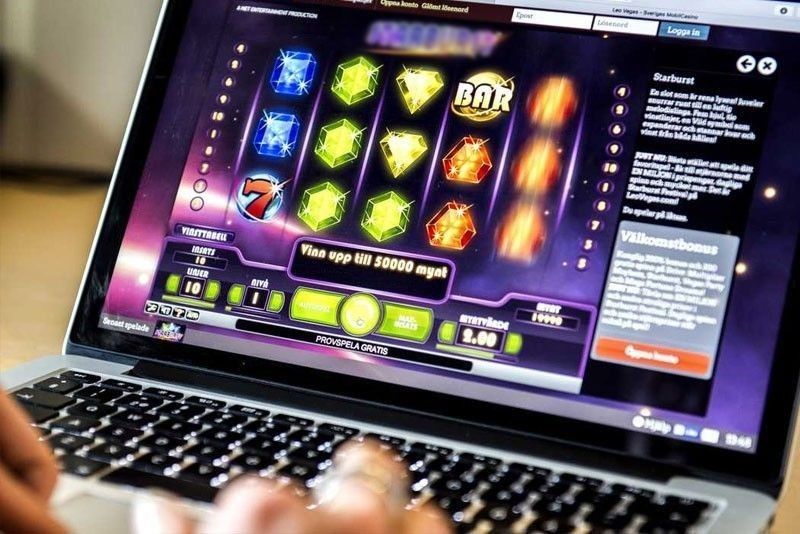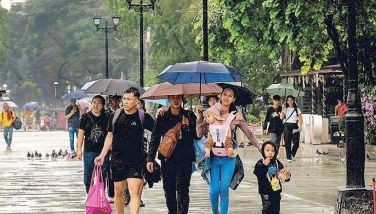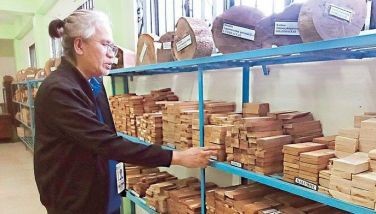'Beijing requires Chinese citizens overseas to abide by local laws' — Chinese Embassy

MANILA, Philippines — The Chinese Embassy in Manila on Sunday said China's government is cracking down on "cross-border telecommunication fraud crimes" but did not directly answer whether the passports of Chinese nationals working in Philippine Offshore Gaming Operators have been canceled.
Citing an unnamed source, rich people news website Bilyonaryo reported Friday that thousands of Chinese POGO workers "got the shock of their lives when their passports were cancelled by the mainland government."
In transcribed remarks released on Sunday, the Chinese Embassy said that "the Ministry of Public Security of China has obtained a list of Chinese nationals suspected of committing long-term telecommunication fraud crimes abroad, who are classified as the persons prohibited from exiting China according to the Exit-Entry Administration Law of the People's Republic of China."
According to China's Exit-Entry Administration Law, "Chinese citizens who exit or enter China shall, in accordance with the law, apply for passports or other travel documents."
The same law holds that:
Under any of the following circumstances, Chinese citizens are not allowed to exit China:
(1) Hold no valid exit/entry documents, or refuse or evade border inspection;
(2) Are sentenced to criminal punishments, the execution of which have not been completed, or are suspects or defendants in criminal cases;
(3) Are involved in unsettled civil cases and not allowed to exit China upon decision of the people’s courts;
(4) Are subject to criminal punishment for impairing border administration, or are repatriated by other countries or regions due to illegal exit from China, illegal residence or illegal employment, and the No-Exit-from-China period has not expired;
(5) May endanger national security or interests, and are not allowed to exit China upon decision by competent departments under the State Council; or
(6) Other circumstances in which exit from China is not allowed in accordance with laws or administrative regulations.
The embassy added that the Chinese government "always requires Chinese citizens overseas to abide by local laws and regulations and not to work illegally in foreign countries."
The embassy said as early as August 2019 that "according to the Chinese laws and regulations, any form of gambling by Chinese citizens, including online-gambling, gambling overseas, opening casinos overseas to attract citizens of China as primary customers, is illegal."
It said Sunday that China has been working closely with the Philippine government and "would like to continue to work closely with the Philippines to combat such crimes as telecommuniations fraud, illegal online-gambling, money-laundering, illegal employment, kidnapping, extortion, torture, murder etc so as to effectively protect the legitimate rights and interests of nationals of the two countries, and to promote the China-Philippines friendship and cooperation."
'Pinapalusutan tayo'
The embassy on Sunday did not, however, explicitly mention POGOs, which have been placed under relative scrutiny in recent months after two separate Senate hearings found links to kidnapping incidents, prostitution dens as well as alleged bribery at the Bureau of Immigration.
In an interview with Dobol B sa News TV, Sen. Sherwin Gatchalian highlighted the losses that came with the seeming sidestepping of the country's regulations, especially when it came to taxes.
RELATED: POGOs now occupy over a million square meters of office space in Metro Manila
"Ang nangyayari ay pinapalusutan tayo nitong mga POGO sa ating bansa. Meron silang tinatawag na offshore companies, so ibig sabihin dito sila nag-ooperate pero hindi sila nagbabayad ng taxes kasi ang kanilang sinasabi ay hindi naman sila Philippine-registered, sila ay off-shore-registered," he said.
(What happens is POGOs are making excuses. They have off-shore companies, so they operate here but they do not pay taxes here because what they are saying is they are not Philippine-registered. They are offshore-registered.)
"Ito ay consistent doon sa sinabi ng [Bureau of Internal Revenue] sa hearing na hindi nila mapuwersang kolektahan itong mga offshore na POGO dahil hindi sila nakarehistro dito," the senator added.
(This is consistent with what the BIR said at the hearing that they cannot make these offshore POGOs pay because they are not registered here)
According to Gatchalian, the BIR had only collected a total of P11 billion from POGO taxes, when his calculations said that the amount should have been closer to some P62 billion.
'At what cost?'
Sen. Risa Hontiveros, at a hearing held earlier this week, disclosed by way of a whistleblower that Immigration personnel at airports would pocket bribes from Chinese nationals who wanted easier entry onto Philippine soil.
At a previous hearing, Hontiveros disclosed the findings of her office's investigation into sex trafficking linked to POGOs, disclosing a "menu" of sexual favors that included Filipino women who fell victim to trafficking.
Some of the women were as young as 14, an informant told her.
RELATED: 5 Chinese held for POGO worker’s kidnap, torture
In January, five Chinese men were arrested for their role in kidnapping and subsequently torturing an employee of one such POGO.
Despite Malacanang's insistence that these were isolated incidents, the the Philippine National Police-Anti-Kidnapping Group has requested additional manpower to assist in their operations against what they said was the rising number of kidnappings on Chinese POGO workers.
READ: Fact check: Makati abduction an 'isolated incident'?
"Is it worth it?" Hontiveros at the hearing asked of the benefits supposedly brought by the presence of POGOs.
"At what cost ito? It shouldn't ever be at the cost of any Filipino woman."
'Little help to PH jobs'
Amid allegations of the industry's skirting of tax laws, think tank Ibon Foundation in a report in January also called into question the government's monitoring of POGOs, given conflicting data on the POGOs in the country.
"Government monitoring and data on the extent and profile of POGO workers appears to be limited, as seen by the varying employment figures of PAGCOR and the BIR," Ibon's report said.
READ: Agencies present conflicting data on POGOs
China's request to ban offshore gambling
In a January report, Ibon Foundation bared a number of misgivings it had with the burgeoning POGO industry, putting into question its supposed benefits.
The research group pointed out that the presence of POGOs in the Philippines was of benefit to Beijing, particularly because much of the Chinese workers supplying the POGO industry hailed from far-flung villages in China and did not have much employment opportunities at home.
"The Chinese government has already asked the Philippines to stop the licensing of all POGO operations due to possible illegal activities. PAGCOR, however, has only suspended the issuance of new licenses while continuing existing licenses and renewals. This call from the Chinese government is a hypocrisy," Ibon said.
"China has banned gambling in its shores, but operators only moved out of China and went to countries offering better incentives. China still benefits from POGO operations due to employment opportunities for its thousands of citizens who have low educational attainment and cannot find work.
"Chinese citizens finding employment in the Philippines is better for the Xi Jinping government since people’s dissatisfaction could destabilize its rule," Ibon Foundation added.
President Rodrigo Duterte said last September that he will not move to ban POGOs because they provide livelihood to Filipinos.
"I decide we need it. Many will lose livelihood. It’s government-controlled," he said.
Ambassador to China Jose Santiago Sta. Romana previously said Beijing has no authority to order the Philippine government to shut down POGO operations employing Chinese nationals.
"They cannot dictate on us. Those are sovereign decisions. That is where we stand," Sta. Romana said in Beijing during Duterte's China visit in August 2019. The Palace said that same month that abolishing the POGOs would be up to Congress.
- Latest
- Trending
































